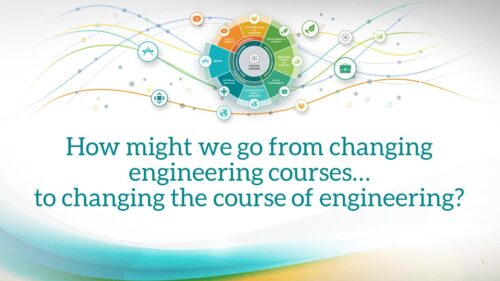Why is sustainability important to the transformation of engineering education? ECL-USA’s virtual summit, Scanning the Horizon of Engineering Education: The Sustainability Imperative, held on March 14, 2023, explored this question. The multi-faceted answers to this question lie in the engineering community’s responsibility in protecting our planet, the massive impact of the work of engineering, engineering student values, employer needs and responsibilities, and the academic community’s role in preparing the next generation.

Cindy Cooper, The Lemelson Foundation
Michael Milligan, CEO of ABET, kicked off the summit highlighting the major work to be done in meeting the UN Sustainable Development Goals. He described how ABET accreditation is uniquely positioned to drive sustainability into undergraduate engineering education and increase engineering’s contributions to a resilient world.
Alessandra Ferzoco of Olin College of Engineering described her work in integrating sustainability into impact-centered education and the dynamics and ethical dilemmas that students face when working with third parties from outside the educational system.
Beth Mical, Holly Rudel, and Rajiv Perera, our panel of engineering students, discussed the importance of sustainability in engineering and how sustainability has shown up in their education. Key insights included their recognition of the impacts of engineering on people and their experiences that the educational system does not provide enough emphasis on sustainability across the entire curriculum.
Summit participants engaged in a group exercise to envision what engineering education could look like given the deep, positive integration of sustainability into the fabric and values of the engineering educational system. Key elements of this future vision included…
- “De-siloing” of the education system – breaking down barriers and increasing collaboration within universities. More interdisciplinary, project-based learning opportunities.
- Integration of deeper interactions with industry to clarify and de-mystify students’ perceptions of what it means to be an engineer and to provide real-world project experience.
- Re-evaluation of traditional core courses.
- Increased learning outside the classroom through internships.
- Integration of non-technical skills into curriculum.
- Increased learning related to life cycle costs and environmental impacts.
- Sustainability integrated across the entire curriculum.
- Continuing education beyond graduation.
The second half of the summit focused on the “Innovators in Action,” those institutions who are leading the way in the integration of sustainability into engineering education. One of those innovator institutions is The Lemelson Foundation through their Engineering for One Planet initiative (EOP). The vision for EOP is to transform engineering education such that “sustainability becomes a core tenet of the profession.” Cindy Cooper summarized progress in development of the EOP Framework and in catalyzing the systemic change needed through development of teaching tools, financial support for curricular change, and supporting collaborative action through formation of an “impact network” of stakeholders from both inside and outside the educational system.
Arizona State University and the University of Maryland are two universities that are collaborating with Lemelson in incorporating EOP principles into their engineering colleges. Adam Carberry of ASU described their pilot project that is incorporating EOP into one of their core, project-based courses and their efforts to train faculty. Vince Nguyen of Maryland focused on their efforts to involve students in new types of “responsible engineering projects” that involve collaboration with organizations across their campus. He also described their efforts to map student learning outcomes related to sustainability principles.
Jennifer Bradford of Siemens provided the perspective of a major employer of engineers. The “Siemens Skills for Sustainability Network” is intended to provide a link between a major employer, engineering educators, and engineering students. They are working to reinforce the connection between education in sustainability and employability. Siemens contributes to this connection by providing forums for students and educators and by providing industry resources – live data, case studies, practical experiences, and educational resources.
In the final group exercise, summit participants looked at the barriers and points of resistance that could prevent or slow the progress of incorporating sustainability into engineering education. These barriers will include inertia to changing the status quo, heavy demands on faculty, professional suicide (overcoming the “publish or perish” paradigm), lack of knowledge and teaching skills, lack of support from academic leaders, and industry demand. Important strategies to address these obstacles that emerged are listed below.
- Need for “proof points” that demonstrate why sustainability is important.
- Seek middle-ground perspectives that overcomes polarization.
- Peer-to-peer sharing of curriculum and learning tools.
- Bringing students into the decision-making process.
- Financial support and credibility through outside grants and industry advisory boards.
- Learning from change experts in other fields. Changing 20% of the system will guarantee that long-term change will occur.
It is clear that the challenges we face in the 21st century require greater contributions from the engineering community. Increasing our contributions will require change and adaptation in the way we approach our work. Numerous engineering organizations have confirmed this need for change. This need is amplified when you consider that today’s engineering graduates will spend up to 40 years in their careers and that the projects that they contribute to will last for up to 75-100 years. The change in engineering education to increase focus on the impacts of our work on people and on the environment needs to start now. All of us in the engineering community can contribute to making this change happen.
The full report from the summit is available at the link below.
Exploring Engineering Education Summit Report
Provocateur presentations are available at the link below.
Exploring Engineering Education Provocateur Presentations
A full recording of the summit is available at the link below.
Exploring Engineering Education Summit Recording
THIS ECL SUMMIT WAS SPONSORED BY NCEES AND PRESENTED IN COLLABORATION WITH ABET, ENGINEERING FOR ONE PLANET AND OLIN COLLEGE OF ENGINEERING.

